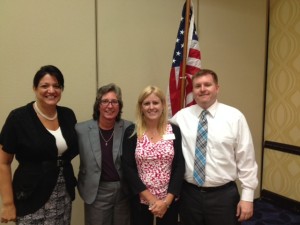Yesterday was a great panel about ISF, ACAS and eBond
The Atlanta International Forwarders & Brokers Association yesterday hosted a panel along with Avalon Risk Management on three topics that are of great interest to Customs brokers and freight forwarders alike.
I was honored to be a panel participant, along with Craig Clark of CBP in Washington and Lisa Gelsomini, President/CEO of Avalon Risk Management.

Lisa Gelsomini, Donna Mullins, Laurie Arnold and Craig Clark after the AIFBA / Avalon Risk Management luncheon program.
The three topics of discussion were liquidated damages claims under the Importer Security Filing (ISF), the continuance of the pilot for Air Cargo Advanced Screening (ACAS) and next year’s implementation of eBonds.
After six years, it looks like finally there will be a Final Rule on the ISF.
People confuse the responsible parties and modalities under ISF and ACAS. ISF is the responsibility of the importer and requires a bond be posted; and it is for cargo that moves and arrives by sea at a U.S. port. ACAS, however, is the responsibility of the air carrier, does not require a bond, and is regulated by both CBP and TSA.
The ACAS pilot was extended for nine more months and is seeking comments and additional participants. Applications for new participants will be accepted through September 26, 2014, and when the NPRM is issued on the program, the best thing that small and medium sized forwarders can do is COMMENT to make their voices known on this program that will affect the industry.
The Atlanta International Forwarders & Brokers Association yesterday hosted a panel along with Avalon Risk Management on three topics that are of great interest to Customs brokers and freight forwarders alike.
I was honored to be a panel participant, along with Craig Clark of CBP in Washington and Lisa Gelsomini, President/CEO of Avalon Risk Management.

Lisa Gelsomini, Donna Mullins, Laurie Arnold and Craig Clark after the AIFBA / Avalon Risk Management luncheon program.
The three topics of discussion were liquidated damages claims under the Importer Security Filing (ISF), the continuance of the pilot for Air Cargo Advanced Screening (ACAS) and next year’s implementation of eBonds.
After six years, it looks like finally there will be a Final Rule on the ISF.
People confuse the responsible parties and modalities under ISF and ACAS. ISF is the responsibility of the importer and requires a bond be posted; and it is for cargo that moves and arrives by sea at a U.S. port. ACAS, however, is the responsibility of the air carrier, does not require a bond, and is regulated by both CBP and TSA.
The ACAS pilot was extended for nine more months and is seeking comments and additional participants. Applications for new participants will be accepted through September 26, 2014, and when the NPRM is issued on the program, the best thing that small and medium sized forwarders can do is COMMENT to make their voices known on this program that will affect the industry.
